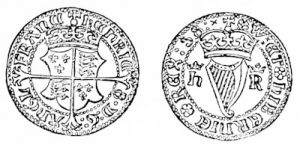
In Ireland the arrangement made by Poynings did not in fact very greatly affect the government of the country at the time. In England, government worked to a certain extent mechanically; that is to say, the general administration of justice and the ordinary enforcement of law went on as a matter of course, even when rival claimants were fighting for the crown.
In Ireland the problem was to make any systematic administration work at all. A strong deputy like Poynings himself could make his hand felt and impress upon the great men a certain respect for authority. So also could a strong man of an altogether different type such as Kildare. But authority had to be personified in a strong ruler; in the abstract, it counted for nothing.
When Kildare died, his son, who was made deputy, proved less efficient that his eccentric but capable father; so the Earl of Surrey was sent over to take the country in hand. The victor of Flodden had been elevated to the dukedom of Norfolk, the title held by his father in the reign of Richard III, and "Earl of Surrey" became the courtesy title of the eldest son of the Duke of Norfolk.
Surrey, like his father, was a capable soldier, and was in frequent employment when larger forces were required on the Scottish borders than those of the Wardens of the Marches. His frank opinion was that force must be vigorously employed if Ireland was to be brought into order. But his idea of an adequate force was more than Henry was disposed to allow him. So the policy of governing by the sword was rejected.
The other policy, of persuading the Irish chiefs to range themselves on the side of law and order, was tried. Unfortunately, their natural instincts were all on the other side. When Kildare was sent back as deputy, they merely concluded that matters were to go on as before. At last Kildare was summoned to England and was shut up in the Tower. A rumour reached Ireland that the ex-deputy had been put to death, whereupon his son, known to fame as Silken Thomas, raised an insurrection.
Silken Thomas's rebellion
There was much raiding and counter-raiding between loyalists and Geraldines, and nearly a year passed before the distinctly incompetent deputy, Skeffington, succeeded in capturing the strong fortress of Maynooth, where the garrison were for the most part hanged, so that the "pardon of Maynooth" became a byword. Silken Thomas was persuaded to surrender, but was ultimately executed as he had not received definite promise of a pardon.
His captor, Lord Leonard Grey, was made deputy, and having promptly proved himself much more than a match for Desmond in the south and O'Neill in the north, he again set out on a policy of conciliation, treating the English party with a very high hand.
Consequently he found himself accused of treason, and his attainder was followed by his execution. Grey had failed disastrously, chiefly because of his arrogance and high-handedness. That the policy of conciliation was a sound one is the natural conclusion to be drawn from the rule of his successor, St. Leger.
A combination of tact and firmness, and a shrewd appreciation of the varying characters of the men with whom he had to deal, enabled St. Leger to establish an unprecedented degree of order and peace. But the root of the trouble lay in the fact that successful government depended almost entirely on the personal character of the Deputy. A series of St. Legers might have solved the Irish problem for the Tudors, and have delivered posterity from an exceedingly perplexing heritage; but unhappily there were no more St. Legers forthcoming, and trouble revived in the ensuing reign.
This article is excerpted from the book, 'A History of the British Nation', by AD Innes, published in 1912 by TC & EC Jack, London. I picked up this delightful tome at a second-hand bookstore in Calgary, Canada, some years ago. Since it is now more than 70 years since Mr Innes's death in 1938, we are able to share the complete text of this book with Britain Express readers. Some of the author's views may be controversial by modern standards, particularly his attitudes towards other cultures and races, but it is worth reading as a period piece of British attitudes at the time of writing.
History
Prehistory - Roman
Britain - Dark Ages - Medieval
Britain - The Tudor Era - The
Stuarts - Georgian Britain - The Victorian Age
